Ukraine crisis: How are people coping with the threat of war?
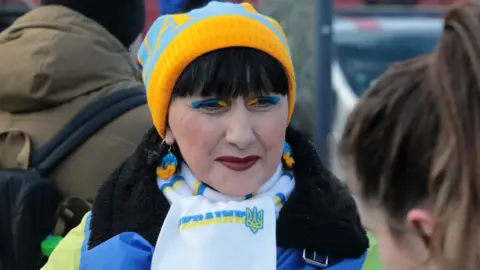 Getty Images
Getty ImagesUkrainians have been living with war since 2014, when separatists seized areas in the east of the country and Russia annexed Crimea.
Recently the threat to the rest of the country has been magnified by a massive build-up of Russian troops on the country's borders.
Three Ukrainians tell the BBC how they have been dealing with life in the shadow of war.
Valentyna: 'I dance to cope with stress'
Valentyna Kovach, 36, is a professional choreographer who runs a dance studio in Kyiv, called ValenDance.
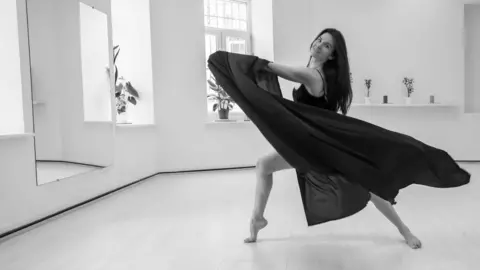 Yana Gryniv
Yana GrynivNormally, the end of winter and early spring are her busiest times with many clients taking up courses in movement and well-being as the weather gets warmer.
But this year is different - the threat of a Russian invasion has made some people less likely to think about a physical and emotional reset; others have put monthly subscriptions on hold to save money.
There are some, Valentyna says, who are still taking up more physical activity to de-stress, but overall her turnover is down amid a general feeling that, at times like these, it is more prudent to save money.
The current level of tension makes it impossible to plan further than a few weeks ahead.
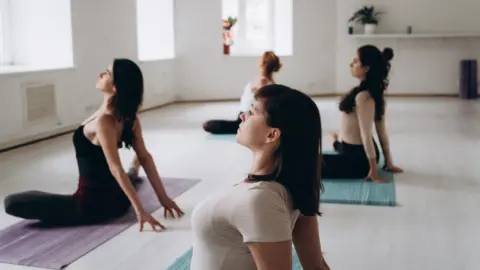 Valentyna Kovach
Valentyna KovachValentyna has a contingency plan, too, if the worst happens and the Ukrainian capital is directly attacked.
Her parents live in the west of the country and relocating there, hundreds of kilometres further away from Russia, would be an option.
But for now, she is trying to stay positive.
"Dance and body classes help to release anxiety," says Valentyna.
"It helps us to feel better. This is what my clients need now more than ever, under all this pressure."
Ruslan: 'I am re-orientating my business'
Ruslan Beliaiev, 45, runs Dronarium, a company which flies drones commercially - organising aerial shows or putting up ads or banners in hard-to-reach places.
One of their best known projects was flying an LGBT rainbow-striped flag over the Ukrainian capital during the Kyiv Pride celebrations in June 2020.
The flag flew over various Kyiv landmarks, including the Statue of the Motherland, and the stunt was covered extensively by the Ukrainian media.
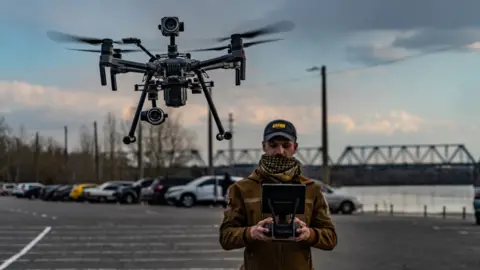 Ruslan Beliaiev
Ruslan BeliaievWorking with commercial clients used to bring in good revenue, but business has slumped - first hit by the pandemic and then the increased tension around Ukraine.
While he is not struggling to buy essentials yet, Ruslan has decided to look for other directions for his business.
Two of his staff are war veterans, who have fought in the conflict in eastern Ukraine. They had an idea.
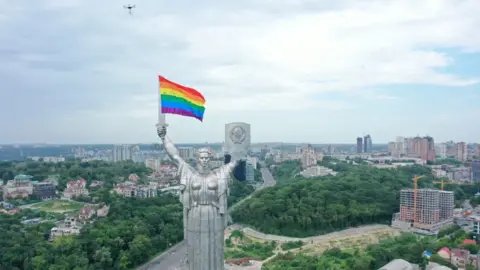 Dronarium
Dronarium"They said we could re-calibrate our drones. Some drones have special cameras, others have thermal imagers. We can use all of them for intelligence," says Ruslan.
Ruslan's company is in the process of setting up a joint project with the Ukrainian territorial defence. This collaboration would keep him going financially, but he has other preoccupations.
He is still worried about the future and the threat of a Russian invasion and is preparing to send his wife and two kids, aged seven and 11, away.
"I think it is unsafe to stay in Kyiv as it could be within reach of Russia's missiles. That's why I'm going to send my wife and children to stay with relatives abroad."
Natalia: One day at a time
Natalia Sad is 35 and has a degree in international relations. She works as a communication officer at the state arms manufacturer, Ukroboronprom.
As tensions rose recently, she started thinking how she would like to focus on the defence sphere even more.
"I can't take up a machine gun," she says. "I don't think I will be of much use."
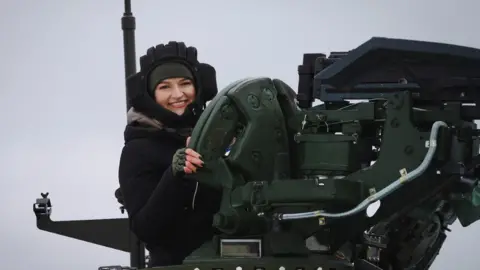 Natalya Sad
Natalya SadBut she does believe that her education and experience will make her a good defence strategist, and she has applied for a two-year executive postgraduate degree at the National Defence University.
She does not plan to leave her job to do the degree, attending courses at weekends.
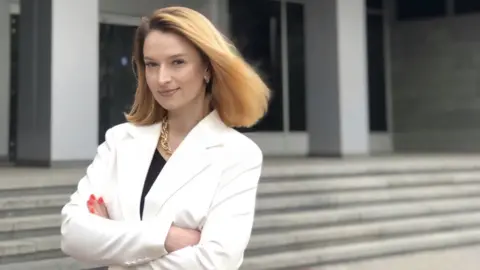 Natalya Sad
Natalya SadNatalya says that even if the invasion doesn't happen imminently, the threat from Russia is not going away. She wants the Ukrainian defence industry to up its game and become more modern and better equipped.
"This current crisis is a global challenge," Natalya says. "It's one country's intention to redraw the map of the world and we must resist it."
But how has the current crisis affected her daily life?
"I am not cutting back. I just continue to live as normal," Natalya says. "My friends have been wondering if it's worth withdrawing cash from banks. I don't think so. I'm sticking to my savings plan to buy a car. I also plan to refurbish my flat."
Like many other Ukrainians, Natalya stresses the need to avoid panic at all costs.
"Living with this threat, I realised that it's important to keep going on with your life here and now, taking it one day at a time."
